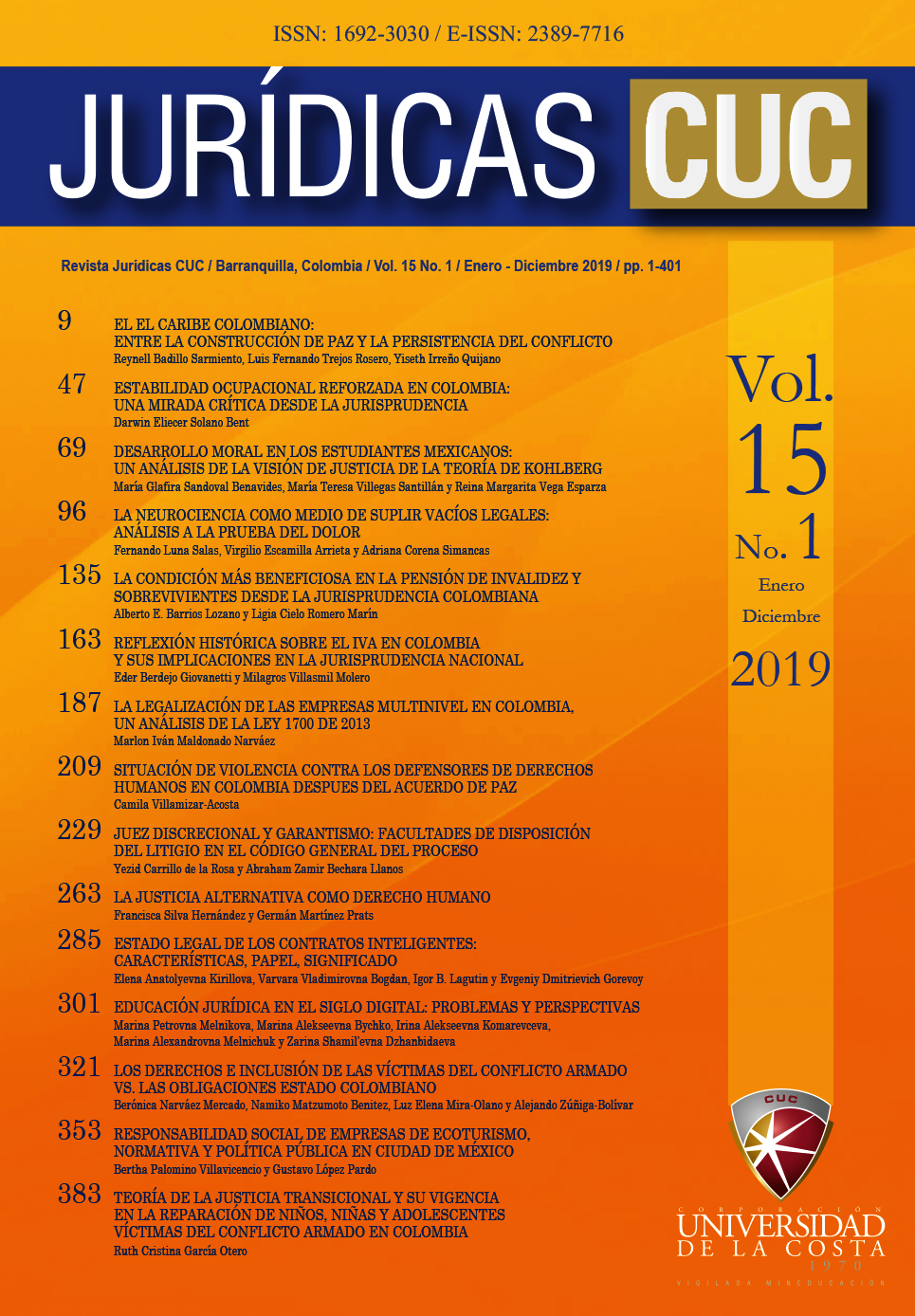Educación jurídica en el siglo digital: problemas y perspectivas
DOI:
https://doi.org/10.17981/juridcuc.15.1.2019.12Palabras clave:
educación jurídica, mensajes legalmente significativos, relaciones legales, tecnologías digitales, tecnologías pedagógicas, aprendizaje electrónico, educación a distanciaResumen
Este artículo tiene por objeto el análisis de las Tecnologías de la Información y la Comunicación-TIC en la educación jurídica de acuerdo a la reforma del sistema educativo nacional ruso. Se observa como la creación de la educación digital en Rusia contribuye a su integración en el medio educativo global. Se parte del marco regulatorio para analizar las TIC en la educación jurídica, el aprendizaje electrónico y la educación a distancia. Con una metodología de análisis crítico se modela la posible implementación del aprendizaje basado en problemas utilizando las TIC y empleando como ejemplo el simulador de “constructor de contrato”. Se concluye que la introducción de las TIC en el proceso educativo requiere un enfoque sistemático, una política estatal del desarrollo de esta área, financiamiento adicional y entrenamiento del personal docente.
Descargas
Citas
Bichko, M. (2019). Webinar microfinance. [Online]. Retrieved from: http://finedu-skfo.ru/
Bolkunov, I. A. (2016). E-learning: problems, prospects, tasks. Tavricheskiy scientific observer, 11(16). Retrieved from: https://cyberleninka.ru
Ektov, A. V. (2017). On the issue of assessing the professional competencies of bachelors of jurisprudence in the conditions of distance learning. Pedagogical education in Russia, 4, 87−94.
European Ministers of Education. (19 june, 1999). Joint Statement by European Ministers of Education. [Bologna Declaration]. Retrieved from: http://base.garant.ru/2564382/
Galyaev, V. N. and Zasanova, Z. A. (2012). On the classification of distance learning models. Higher education in Russia, 4, 103.
Kamal, M. N. and Tsapko, E. A. (2013). Moodle - a modern Internet environment in the educational technologies of the university. Bulletin of science of Siberia, 4(10), 146−148.
Kupavtsev, T. S. and Malchenko, E. (2008). Using the method of problem-based learning in the educational process of the university of the Ministry of Internal Affairs of Russia as a means of enhancing the self-improvement of cadets and students. Scientific-theoretical journal “Uchenye zapiski”, 9, 35.
Moshkalov, A. K. (2012). Principles of distance learning. Retrieved from: http://www.rusnauka.com/10_DN_2012/Pedagogica/1_106157.doc.htm
MSU. Lomonosov Moscow State University. (2007). Conception of distance learning system development at Lomonosov Moscow State University. [Online]. Retrieved from: https://www.msu.ru/study/dopobr/docs/conception.pdf
Russian Federation. Ministry of Science and Higher Education. (23 august 2017). On Approval of the Procedure for the Application by Educational Organizations of E-Learning, Distance Learning Technologies in the Implementation of Educational Programs. [Order No. 816]. Retrieved from: http://ivo.garant.ru/#/document/71770012/paragraph/20:0
Russian Federation. Ministry of Science and Higher Education. (4 may 2017). On Approval of the Procedure for Organizing and Implementing Educational Activities in Higher Education Educational Programs - Undergraduate Programs, Specialty Programs, Magistracy Programs. [Order No. 301].
Russian Federation. Ministry of Science and Higher Education (20 january 2014). On approval of the lists of professions and specialties of secondary vocational education, the implementation of educational programs for which are not allowed using only e-learning, distance learning technologies. [Order № 22]. Retrieved from: http://www.consultant.ru
Russian Federation. Ministry of Science and Higher Education. (19 march 2014). Information material of the Ministry of Science and Higher Education of the Russian Federation [Online]. Retrieved from: https://ido.tsu.ru/normdocs/elearning/PS%2019.05.2014%20-%20Material%20Minobrnauki.pdf
Russian Federation. Ministry of Science and Higher Education.(29 december 2012). On Education in the Russian Federation. [Federal Law No. 273-FZ]. Retrieved from: http://www.consultant.ru
Russian Federation. Ministry of Science and Higher Education. (27 July 2006). On Information, Information Technologies and Protection of Information. [Federal Law No. 149-ФЗ].
Russian Federation. Ministry of Science and Higher Education. (27 july 2006). On Personal Data. [Federal Law No. 152-ФЗ].
Russian Federation. Prezident Rossíyskoy Federátsii. (26 may 2009). On measures to improve higher legal education in the Russian Federation. [Decree No. 599]. Retrieved from: http://www.consultant.ru
Russian Federation. Prezident Rossíyskoy Federátsii. (26 December 2017). On Approval of the State Program of the Russian Federation“ Development of Education. [Decree No. 1642].
Sagalaeva, E., Komarevceva, I., Landina, O., Melnichuk, M. and Mukhametova, S. (2018). Pedagogical technologies in legal education: Historical analysis and modern experience. International journal of engineering and technology, 7(3.15), 309−313. https://www.sciencepubco.com/index.php/ijet/article/view/18695
Segal, D. (nov 19, 2011). What They Don’t Teach Law Students: Lawyering By David Segal. The New York Times. Retrieved from: https://www.nytimes.com/2011/11/20/business/after-law-school-associates-learn-to-be-lawyers.html
SKFU. (2019). Official website of SKFU. [Online]. Retrieved from: http://www.ncfu.ru/
Tereshchenko, E. A., Kovalev, V. V., Balakireva, L. M., Savchenko, E. V. and Solovtsova, E. A. (2017). Characteristics of Legal Culture Study in Russian and Foreign Legal Literature. Journal of Advanced Research in Law and Economics, 8(5), 16−19.
Descargas
Publicado
Cómo citar
Número
Sección
Licencia
Derechos de autor 2019 JURÍDICAS CUC

Esta obra está bajo una licencia internacional Creative Commons Atribución-NoComercial-SinDerivadas 4.0.
Los artículos publicados son de exclusiva responsabilidad de sus autores y no reflejan necesariamente las opiniones del comité editorial.
La Revista JURIDICAS CUC respeta los derechos morales de sus autores, los cuales ceden al comité editorial los derechos patrimoniales del material publicado. A su vez, los autores informan que el presente trabajo es inédito (original) y no ha sido publicado anteriormente.
Contrato de cesión de derechos patrimoniales de autor
Formato de certificación de originalidad del artículo por parte del autor
La revista JURÍDICAS CUC se guía por las normas internacionales sobre propiedad intelectual y derechos de autor, y de manera particular por el artículo 58 de la Constitución Política de Colombia, la Ley 23 de 1982 y la ley 1915 de 2018.


 English
English
 Español (España)
Español (España)



